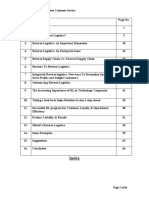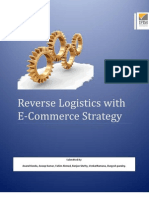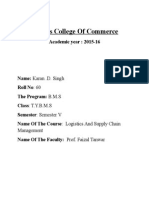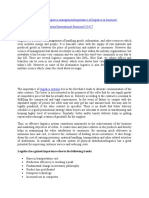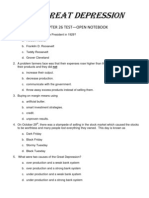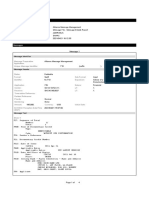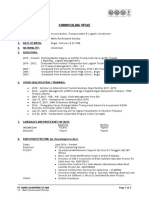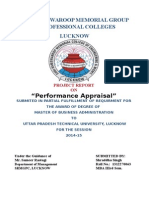0 ratings0% found this document useful (0 votes)
45 viewsReverse Logistics Basics
Reverse logistics involves the returns process from customers back up the supply chain due to issues like quality problems or legal/environmental regulations. It was once seen as an unprofitable necessity, but is now recognized as a strategic activity that can enhance competitiveness. Reverse logistics encompasses all post-sale and service activities needed to efficiently reuse or dispose of products and packaging. It aims to save cash and resources rather than waste. As reverse logistics grows in importance due to trends like globalization and e-commerce, companies that master reverse logistics will gain an advantage over their competitors.
Uploaded by
ArindomCopyright
© © All Rights Reserved
Available Formats
Download as PDF, TXT or read online on Scribd
0 ratings0% found this document useful (0 votes)
45 viewsReverse Logistics Basics
Reverse logistics involves the returns process from customers back up the supply chain due to issues like quality problems or legal/environmental regulations. It was once seen as an unprofitable necessity, but is now recognized as a strategic activity that can enhance competitiveness. Reverse logistics encompasses all post-sale and service activities needed to efficiently reuse or dispose of products and packaging. It aims to save cash and resources rather than waste. As reverse logistics grows in importance due to trends like globalization and e-commerce, companies that master reverse logistics will gain an advantage over their competitors.
Uploaded by
ArindomCopyright
© © All Rights Reserved
Available Formats
Download as PDF, TXT or read online on Scribd
You are on page 1/ 3
1
The Basics of Reverse Logistics
Supply Chain Management is a term with which we are all familiar with, being the logistics and
management planning involved in bringing the finished product to the customer or end-user, in
the most efficient way. However, what about flow in the opposite direction? The returns from the
customer, because of product quality, environmental pollution as implemented by new statues,
design problems, higher losses and higher emissions etc. A decade back, businesses saw this
reverse flow as an unprofitable logistics exercise and termed it A necessary evil. Today with
globalization and e-commerce, business have categorized this as a means of profit by making the
customer aware of how efficiently and skillfully, this return flow is tackled which has been
named as Reverse Logistics. As Reeves states Recently reverse logistics has begun to
lose its "necessary evil" status, and analysts and industry veterans point to several
trends that have increased the importance, and raised the profile, of the reverse
logistics process (Reeves,2005, pp44-47). Today it is seen more like a strategic activity, that
can enhance supply chain competitiveness in the long run. Reverse logistics can be defined as
all activities arising after the sale i.e. the aftermarket business and the principles necessary
applied to keep the same at maximum efficiency and productiveness
(Diane&David,2005,9pp 34-
35), so that both cash and
material resources are saved
from waste
The adjacent chart shows
clearly the differences or the
start and ends of the forward
2
supply logistics and reverse logistics (taken from the RLA homepage).
At first sight, it appears that the different facets of reverse logistics are almost double that of
conventional forward logistics and supply chain management. However, if we look at the subject
headlines more closely, we will see that most businesses have been practicing these all along but
not under a common umbrella. So now, what do we do? There is only a single answer .We
utilize and implement all management principles, which we have built up, in the reverse-logistics
scenario, under which the entire gamut of post-sales /service functions has to be dragged into.
Whoever will do their reverse logistics more efficiently will win the battle because reverse
logistics is a much stronger USP then forward-logistics. This is because the latter is consumed
and disappears from our sight but the former hangs around and reminds the managers of due
dates gone by and promises not kept.
An example of this is the HP printer cartridge, which is so expensive that organized competition
has today become possible even at the risk of the HP warranty not being honored. What can HP
do to salvage its cartridge business? It can hardly admit that they have been charging us inflated
prices, it cannot. Till now, HP has not come up with anything in this regard but the giant is
already taking notice and some sort of declaration from HP soon, will not be surprising. The ink-
refillers now not only save the customers money but also reduce e-waste and now are also,
laughing all the way to the bank at HP.
Environmental Pollution is one more area where reverse logistics can play a stellar role. In fact,
they may not have that choice if statutes like Germany are passed, that the manufacturer is
responsible for your waste and pollution. The customer is only buying the value. Therefore, each
3
supply contract can have a provision that the pollution if any and waste, is to be taken care of by
the supplier.
This is an extreme thought but can happen unless we wake up to the importance of reverse
logistics and develop our own national industries into this path. All industrialists have to be
aware of this phenomenon. Until reverse logistics platform is made, the US will be back at the
head of industry soon until the other countries catch-up, in the reverse-logistics way.
Reference List/ Bibliography:
Diane A.M & David J.C.(2005) ; The Hidden vale in Reverse Logistics The Supply and
Demand Chain Executive Magazine,9 (34-41)
Krikker H.R. & De Velde S. (2003): Creating value from returns; Center for Applied
Research, Netherlands.
Reeves A.K,2005; Meeting the reverse logistics challenge The Supply and Demand
chain executive Magazine, 6 (44-47);2005)
Table borrowed from http://www.reverselogisticstrends.com/reverse-logistics.php available
at and accessed on 10/03/2012.
You might also like
- English HKSI LE Paper 5 Pass Paper Question Bank (QB)No ratings yetEnglish HKSI LE Paper 5 Pass Paper Question Bank (QB)10 pages
- (Lecture Notes in Logistics) Wolf-Rüdiger Bretzke, Karim Barkawi (Auth.) - Sustainable Logistics - Responses To A Global Challenge-Springer-Verlag Berlin Heidelberg (2013) PDFNo ratings yet(Lecture Notes in Logistics) Wolf-Rüdiger Bretzke, Karim Barkawi (Auth.) - Sustainable Logistics - Responses To A Global Challenge-Springer-Verlag Berlin Heidelberg (2013) PDF539 pages
- Nike's Core Competency: The Risky Business of Fairy TalesNo ratings yetNike's Core Competency: The Risky Business of Fairy Tales7 pages
- Reverse Logistics For Better Customer Service-1No ratings yetReverse Logistics For Better Customer Service-166 pages
- (2005) Mollenkopf & Closs - The Hidden Value in Reverse LogisticsNo ratings yet(2005) Mollenkopf & Closs - The Hidden Value in Reverse Logistics9 pages
- Outsourcing Reverse Logistics: W EditionNo ratings yetOutsourcing Reverse Logistics: W Edition27 pages
- Reverse Logistics: Henrique Mendonca Bouchra Mrabet Daniel Restrepo Mario Velez100% (1)Reverse Logistics: Henrique Mendonca Bouchra Mrabet Daniel Restrepo Mario Velez36 pages
- Axioms: Outsourcing Reverse Logistics For E-Commerce Retailers: A Two-Stage Fuzzy Optimization ApproachNo ratings yetAxioms: Outsourcing Reverse Logistics For E-Commerce Retailers: A Two-Stage Fuzzy Optimization Approach22 pages
- What Is Reverse Logistics - Khuene NagelNo ratings yetWhat Is Reverse Logistics - Khuene Nagel6 pages
- The New Logistics Management Paradigm: The Impact of Today's TrendsNo ratings yetThe New Logistics Management Paradigm: The Impact of Today's Trends7 pages
- Introduction To Logistics and Supply Chain Management (SCM)No ratings yetIntroduction To Logistics and Supply Chain Management (SCM)6 pages
- Managing The Global Supply Chain in An Uncertain World Martin ChristopherNo ratings yetManaging The Global Supply Chain in An Uncertain World Martin Christopher6 pages
- Reverse Logistics With E-Commerce StrategyNo ratings yetReverse Logistics With E-Commerce Strategy12 pages
- Why Investing in Procurement Makes Organizations More ResilientNo ratings yetWhy Investing in Procurement Makes Organizations More Resilient5 pages
- Arulmadhav_Finspire Article - ARULMADHAV U BNo ratings yetArulmadhav_Finspire Article - ARULMADHAV U B2 pages
- Rise of Reverse Logistics: Nmims - Mba - 2 Year Shashank Yagnick, 9004073881 Tushar Jain, 9768836017No ratings yetRise of Reverse Logistics: Nmims - Mba - 2 Year Shashank Yagnick, 9004073881 Tushar Jain, 97688360175 pages
- Reverse Logistics Case WCC Program DesignNo ratings yetReverse Logistics Case WCC Program Design10 pages
- Demand Driven Distribution: The Logistical Challenges and OpportunitiesNo ratings yetDemand Driven Distribution: The Logistical Challenges and Opportunities16 pages
- Filetype PDF Developing A Theory For Reverse LogisticsNo ratings yetFiletype PDF Developing A Theory For Reverse Logistics2 pages
- Assignment 1 Reverse Logistics Study MaterialNo ratings yetAssignment 1 Reverse Logistics Study Material42 pages
- Coyle Chapter 15 Powerpoint Slides - PPT - Presentation TranscriptNo ratings yetCoyle Chapter 15 Powerpoint Slides - PPT - Presentation Transcript19 pages
- Clara's College of Commerce: Academic Year: 2015-16No ratings yetClara's College of Commerce: Academic Year: 2015-1610 pages
- Logistics Has Gained Importance Due To The Following TrendsNo ratings yetLogistics Has Gained Importance Due To The Following Trends3 pages
- Doctoral Dissertations in Logistics and Supply Chain ManagementNo ratings yetDoctoral Dissertations in Logistics and Supply Chain Management5 pages
- Eco-Responsibility Is A Key Component of Reverse LogisticsNo ratings yetEco-Responsibility Is A Key Component of Reverse Logistics25 pages
- Going Circular: The Evolution of Reverse Logistics into a Competitive WeaponFrom EverandGoing Circular: The Evolution of Reverse Logistics into a Competitive WeaponNo ratings yet
- Lean Distribution: Applying Lean Manufacturing to Distribution, Logistics, and Supply ChainFrom EverandLean Distribution: Applying Lean Manufacturing to Distribution, Logistics, and Supply Chain2.5/5 (2)
- Conception for Procurement Excellence: The performance profile and degree of digitalization of procurementFrom EverandConception for Procurement Excellence: The performance profile and degree of digitalization of procurementNo ratings yet
- Management Systems in digital business Environments: Howto keep the balance of agility and stability while establishing governance frameworksFrom EverandManagement Systems in digital business Environments: Howto keep the balance of agility and stability while establishing governance frameworksNo ratings yet
- On Acute Care Facilities (ACF) in The US Health Care Delivery SystemNo ratings yetOn Acute Care Facilities (ACF) in The US Health Care Delivery System2 pages
- Marriage and Divorce Act) Which States 'A Parent Not Granted Custody of The Child Is EntitledNo ratings yetMarriage and Divorce Act) Which States 'A Parent Not Granted Custody of The Child Is Entitled3 pages
- Running Head: Web Site Credibility and How To Judge ItNo ratings yetRunning Head: Web Site Credibility and How To Judge It3 pages
- What Are Folds? What Is Their Geologic Importance?100% (1)What Are Folds? What Is Their Geologic Importance?18 pages
- The Great Depression: Chapter 26 Test-Open NotebookNo ratings yetThe Great Depression: Chapter 26 Test-Open Notebook5 pages
- Communication Plan For PAGCOR's CSR - Casino and Gaming100% (1)Communication Plan For PAGCOR's CSR - Casino and Gaming2 pages
- Customer Notice - New Loadshedding ScheduleNo ratings yetCustomer Notice - New Loadshedding Schedule2 pages
- Sanitised 185 K Usd LC After Sight LC To BocNo ratings yetSanitised 185 K Usd LC After Sight LC To Boc4 pages
- E700 - Union Square Bus Station To Fujairah100% (8)E700 - Union Square Bus Station To Fujairah3 pages
- Study of The Ottoman Modernisation of The City-Isik Demirkan PDFNo ratings yetStudy of The Ottoman Modernisation of The City-Isik Demirkan PDF125 pages
- UNIT 11 - Market Leader Pre Intermediate - New BusinessNo ratings yetUNIT 11 - Market Leader Pre Intermediate - New Business4 pages
- Performance Appraisal in Surya Up Gramin Bank Panjab National (PNB)0% (1)Performance Appraisal in Surya Up Gramin Bank Panjab National (PNB)88 pages
- Chapter Five: Market Structure 5.1 Perfectly Competition Market StructureNo ratings yetChapter Five: Market Structure 5.1 Perfectly Competition Market Structure27 pages
- Introduction to Computable General Equilibrium Models 2nd Edition Mary E. Burfisher - The ebook is available for online reading or easy download100% (2)Introduction to Computable General Equilibrium Models 2nd Edition Mary E. Burfisher - The ebook is available for online reading or easy download61 pages






